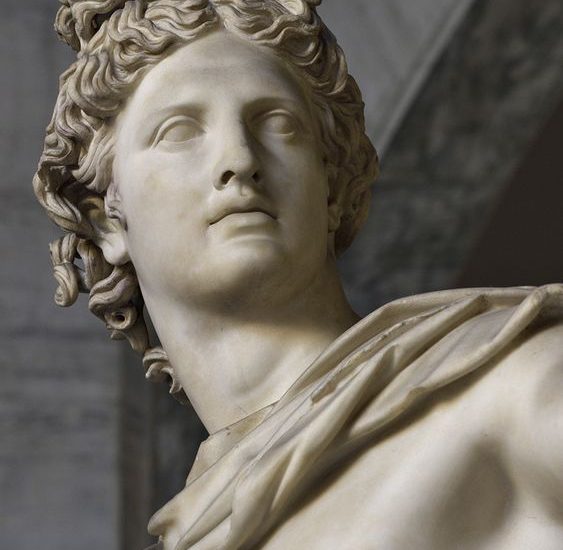Apollo, Dionysos, taken from the Greek mythology, are two gods with opposing nature. Around the two, Nietzsche redefined a theory of aesthetics, even a new method of conceptualisation. Eventually, I came up with my own definition of the two.
Apollo, the god of of the sun, symbol of rationality. Rationality, from a contemporary perspective, is the will to organise reality through concepts, categories, logic etc, The Apollonian could also be identified as this capability. I have to mention, that from a Darwinist and materialistic (scientific) perspective, which is the dominating Western culture perspective, rationality is basically defying entropy. The world could be infinite amount of things, infinite combination, we do not necessarily have to make distinctions and definitions (hint for the Dionysian), but when we do it, it serves our survival, it promotes life. The basic Apollonian capability is survival, pattern recognition, extrapolation, using the mind to get an advantage, avoiding death at a basic level.
Something different went with humans when comparing them to all other animals. The Apollonian did not continue to function only at instinct level. We humans can have an exterior look about our instincts. Around the time that Ludwig Boltzmann (1844-1906, born the same year as Nietzsche), developed his theory, it came to us, exploring scientific nature and its determinisms and rules, that the tendency of the universe is not to get organised (by gods, by mother nature, by us, or whatever), but, the second principle of thermodynamics shows us that all organised systems will get disorganised as time passed, the natural state of things, on a really big scale, is chaos. Order, seems to be temporary it time.
This can lead to the hypothesis, assuming contingency, that the Apollonian exists only in a small spectrum in time, only on a certain scale, and only in the human or animal mind. We then can never get absolute definitions and distinctions, since nature of things is “everything is flowing”, panta rhei (πάντα ῥεῖ). To try to explain it : if we assume the nature of the universe is not to be organised, we can safely assume perception is something contingent in nature, that just happened without any reason or a goal/destination. If we accept this, we should also give up any theological or teleological or even logical type of explanations, and just accept it that life can not have meaning outside context of absolute reason or an absolute goal. There is a different type of logic, of chiasmic unity, signifying an irreducible entanglement which violates the principle of non-contradiction. Chiasmic logic suspends the system of binary opposition on which the principle of non-contradiction is based, but without reducing oppositions to some form of synthetic unity
Order (and therefore logic and rationality), is an illusion of our mind and is limited in time and internal to human perception. This is a Nietzschean, philosophical assumption, which today is scientifically justified. I am not the fool to not see beyond the illusion of language to find universal validity in this hypothesis. Logic and rationality should then become an open end system, a gay science, a form of art, philosophy or religion.
Its finally time to talk about Dionysus. The Dionysian state of mind happens when one get drunk from wine, from the ecstasy of battle or any other experience which makes our experience of reality not so dependant on our senses, but rather something else. Indeed, in ecstasy, the sense of time, sense of self, sense of objectivity and subjectivity become blurred. It is no longer possible, during the Dionysian ecstasy, to separate myself from the universe, or nature, or other beings.
These experiences undermines objectivity, rationality and the ego. There is a dialectical relation between Apollo and Dionysus. They are both valid and wrong at the same time, they represent opposite perspectives which cannot exist without the other, they reflect a non Judeo-Christian world feeling, a pagan world feeling.
How can this translate to a day to day reality ? Well, in certain situations we will come across the Dionysian, the ecstatic. Experiences such as being in nature, near death experiences such as battle, intoxication, magic rituals, acts of love, acts of imagination which are common with non-adults. Such experiences are a perfect basis for undermining the technical (τέχνη) Apollonian experience : linear time, schedules, binary definitions, certainty, language, basically the ever-failing-attempt to create the illusion of statics, freezing time, looking at the world as fixed-relations, objectivity.
When I talk about the specific ‘pagan’ relation between Apollo and Dionysus, it mostly concerns ancient religion, ritual, art and music. Through these, we can experience both stasis and ecstasy at the same time, and as such, the tension and release involved. We are then taking part in the human and nonhuman dance of the universe.
For Nietzsche, music was the perfect example of the Apollonian and Dionysian. Music defies the tyranny of light, it cannot fully be captured by physics or notes, it is part of a human mental state, within time, reaching to the ever-unknown, to a reality which is both linear, conceptualised, static and paradoxically, at the same time, ecstatic, emotional, phenomenological and existential, transcending above language, having its own meta justification, maybe the best example of something that can justify existence in the time of no believe in an origin or a telos.

